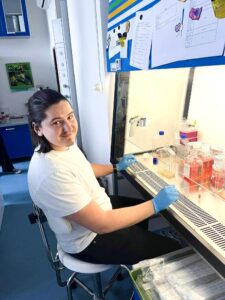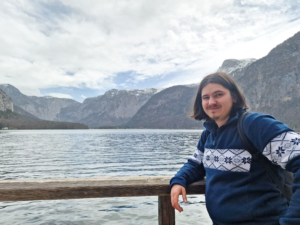Daniil Starenko won the institutional Master Thesis Competition with his research on polymer conjugates, which could help in the treatment of cancer. During his master’s studies, his main topic was biochemistry, but now he is focusing on immunology in his PhD project. “The research topics at the Laboratory of Tumor Immunology have always interested me and I almost did not hesitate before joining the laboratory,” he says.
When did you decide you wanted to do research? Have you always enjoyed science?
I think I started having first thoughts about wanting to do research during my bachelor’s studies. In high school, I was thinking more about industry and more chemically oriented work. However, studying biochemistry and molecular biology in university really got me excited about research. These are fields that show how fascinating and complex a system any organism is. In addition, we can use this knowledge, for example, to develop new medicines and technologies that are able to improve human lives. The first experience working in the laboratory also helped me decide that I want to continue learning something new and devote myself to research in the near future.
Why did you decide to do research at the IMIC? Why in the Laboratory of Tumor Immunology?
Joining Dr. Marek Kovář’s Laboratory of Tumor Immunology at the IMIC was basically a very lucky coincidence for me. I worked out my bachelor’s thesis at the Department of Biomedical Polymers under the supervision of Dr. Tomáš Etrych at the Institute of Macromolecular Chemistry of the Czech Academy of Sciences. Dr. Etrych proposed me as a graduate student to Marek Kovář at the IMIC. I was interested in the research topics of the Laboratory of Tumor Immunology, and I almost did not hesitate before joining the laboratory. In the end, I am very glad I made this decision. Dr. Kovář is a great leader who is always willing to help with useful advice. We have an excellent and friendly team in the laboratory. Working in such an environment can be really inspiring and fun, which I think is a necessary characteristic for any (not only) scientific workplace that aims to achieve great results.
You won the institutional Master Thesis Competition. What is your thesis about?
The topic of my thesis is research on polymer conjugates. I was most concerned with one particular conjugate carrying the lopinavir inhibitor. This conjugate was subsequently investigated as part of combination therapy together with conjugates carrying various conventional cytostatic drugs.
To explain this: the binding of drugs to a polymeric carrier allows their greater accumulation and specific release at the site of the tumor. This can limit the side effects of cytostatics, which are the biggest problem when using conventional tumor chemotherapy. However, the central part of my thesis research is a polymer carrying the inhibitor lopinavir. This drug has two activities that may be beneficial for cancer therapy. First, it is a potent inhibitor [substance that slows down or stops the reaction] of P-glycoprotein – a special transporter in the cell membrane, which can exclude many types of chemotherapy molecules from the cell and is responsible for the emergence of multidrug resistance. Second, lopinavir can inhibit the signaling molecule STAT3, whose persistent activation in some tumors induces resistance to cell death. The combination of polymers carrying lopinavir and polymers carrying conventional cytostatics can therefore be used to sensitize resistant tumor cells to the effect of chemotherapy. In the end, the results were quite promising, and the research topic is still being worked on even after the defense.
What’s next for you? Will you continue working in research?
I am currently in the first year of my PhD studies and continue working in the field of immunology (I studied biochemistry during my bachelor’s and subsequent master’s programs). Such a change of field for doctoral studies can be challenging, but immunology has always been a subject of interest to me, so now I find the study even more engaging. The topic of my dissertation is somewhat similar to what I did during my master’s degree. It is again devoted to polymer conjugates. However, now they are conjugates intended for prostate cancer therapy. We are planning a lot more immunology research, which I’m really looking forward to and I think it’s going to be an interesting challenge for me.
What do you do when you’re not in the lab?
Lately I’ve been trying to be a little more active and go to the gym or ride a bike. I really enjoy cycling and I think that Prague is a really good city for cycling. Here you can find many beautiful trails. I also enjoy hiking. I like to go on hikes in nice places, mainly in the Czech Republic, but sometimes also abroad. In the summer I like to go down rivers in a canoe or kayak. Another big hobby for me is music. I’ve been playing drums for quite some time now, mainly rock and metal, but I try to be open to as wide a range of musical styles as possible. It’s always an energizing experience for me.
Thank you for the interview and good luck with your studies and research!




